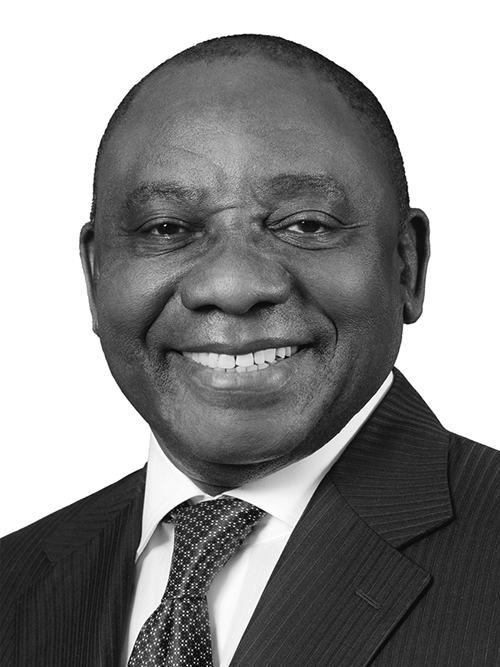Minister of Forestry, Fisheries and the Environment, Ms Barbara Creecy,
Premier of Gauteng, Mr Panyaza Lesufi,
Ministers, Deputy Ministers and MECs,
Chairperson of the National House of Traditional and Khoi-San Leaders,
and all the Royal Highnesses who have graced this occasion,
Chairpersons of Boards of public entities,
Heads of Department,
Representatives of business, civil society and organised labour,
Distinguished Guests,
Ladies and gentlemen,
Thank you for inviting me to join the important conversation at this Indaba on growing, transforming and financing our significant biodiversity economy.
South Africa is endowed with rich biodiversity.
We have many iconic plant and animal species that have long been integral to our culture, spirituality and livelihoods as Africans, and also highly valued across the world.
We have co-existed harmoniously with our biodiversity because we recognise the importance of the interdependent and respectful relationship between humankind and nature.
Natural resource use has underpinned traditional economies and societies of Africa, and our people have been harvesting biodiversity products for millennia, and doing so sustainably.
Today, sustainable use of biodiversity is a pillar of rural economies across South Africa, supporting hundreds of thousands of jobs.
Sustainable biodiversity use also contributes to urban economies. For example, traditional medicine markets exist in nearly every major urban centre in South Africa.
The trade in indigenous medicine plants is a multi-million-rand industry that supports jobs and livelihoods across the value chain.
As a country, we have been firm that communities must benefit in a tangible manner when plant and animal species are harvested for commercial gain.
A good example of this approach is rooibos, a product that is popular not just in South Africa but around the world.
Four years ago, the first industry-wide benefits sharing agreement was launched between the South African Rooibos Industry and the Khoi and San Councils.
This agreement has to date distributed a total amount of R28 million to the two councils in recognition of the communities’ indigenous knowledge of the rooibos species.
Another product is aloe, a plant that is indigenous to Southern Africa and is harvested for pharmaceutical and cosmetic purposes.
To date approximately, R46 million has been paid by permit holders directly to aloe ferox tappers.
Aloe Ferox is just one of countless indigenous species with medicinal and other value that are being used in commercial applications.
There is also Sceletium, Marula, Pelargonium and Buchu, the shrub that has been used by the Khoi and San peoples for healing and traditional rituals for centuries.
Approximately R29 million has been paid to traditional authorities in the Eastern Cape, Northern Cape, North West, KwaZulu-Natal and Limpopo in recognition of indigenous knowledge associated with these species.
We know that compensation in recognition of indigenous knowledge held by communities is not enough.
We know that payment to communities for harvesting these species is also not enough.
There must be tangible beneficiation in communities when indigenous plant species are harvested for commercial benefit, whether it is for medicine, cosmetics or other purposes.
Sustainable mass cultivation of indigenous plant species must support the creation of businesses, factories and value chains that allow for end products to be exported to the rest of the continent and abroad.
This mass cultivation can also assist land restoration and rehabilitation, as well as carbon sequestration, which is important in the context of climate change.
To ensure a more holistic approach to access and benefit sharing, we are developing nurseries for the production of indigenous species, so these can be cultivated for medicinal and cosmetic purposes.
When it comes to animal species, beneficiation must result in the establishment of community-run businesses, be they lodges or game meat butcheries and production facilities.
We have a Game Meat Strategy that is focused on scaling economic enterprises for communities and previously disadvantaged individuals and providing land use patterns that are compatible with conservation.
There are already a number of commercially successful game meat production facilities in several parts of the country.
Another example is marine biodiversity. For many decades, fishing was the preserve of commercial enterprises only. This is something we are working hard to change.
In January this year, we allocated 15-year fishing rights to the small-scale fishing sector in the four coastal provinces. We must build on this.
Job creation must be at the centre of our efforts.
As with our mineral resources, we cannot simply be mere exporters of raw materials so that jobs and industries can be created elsewhere.
Jobs and opportunities must remain here, in South Africa, in our communities.
This is what the revised Biodiversity Economy Strategy aims to address.
It aims to synergise our economic and conservation objectives by emphasising that a successful biodiversity economy must be linked to the restoration of ecosystems.
It broadens the existing terrestrial goals and adds marine, coastal, estuarine and freshwater opportunities.
This strategy places the transformation of the biodiversity sector at the centre of all we do.
Rural communities, disadvantaged individuals and traditional leaders must be part of devising new approaches to investment in community-owned land for biodiversity-based enterprises.
This Indaba is an opportunity for business entities, conservation management authorities, previously disadvantaged individuals and communities to pitch their biodiversity business concepts to potential investors.
The projects include investment opportunities with national parks, world heritage sites, botanical gardens and provincial nature reserves; community-owned wildlife businesses; bioprospecting; and ecotourism.
For us to fully harness the benefits of the biodiversity economy, we have to understand its scope and breadth.
Work is underway to develop Natural Capital Accounting for the biodiversity sector.
This is being done through a partnership between the Department of Forestry, Fisheries and the Environment, Statistics SA and the South African National Biodiversity Institute.
This initiative will ensure that the contribution of the biodiversity sector, including its entire value chain, is formally recognised.
Ladies and Gentlemen,
The Global Biodiversity Framework that was adopted in December 2022 aims to ensure that biodiversity is valued, conserved, restored and wisely used, sustaining a healthy planet and delivering benefits essential for all people.
The Framework has three central aspects.
The first is the recognition that human and ecosystem sustainability requires a global target of 30 percent of the land and 30 percent of the sea be placed under protection by 2030.
The second is that communities living in and adjacent to conservation estates must benefit from the economic opportunities created.
The third aspect is that the intellectual property of indigenous people must be recognised and compensated.
There is also agreement that developed economy countries must assist developing economies in achieving global conservation targets.
The work to conserve and restore our biodiversity takes place as the world is experiencing the increasingly destructive effects of climate change.
African countries are among the most vulnerable to the effects of a rapidly changing climate. They have to adapt and build resilience within the context of historically low levels of development and severely limited capacity.
The Climate Change Bill, which is currently before the National Council of Provinces, seeks to enable a just transition towards a low-carbon, climate-resilient society.
This just transition must contribute toward the creation of decent work for all, social inclusion and the eradication of poverty.
The Bill recognises that a robust and sustainable economy and a healthy society depend on the services that well-functioning ecosystems provide.
The Bill maintains that enhancing the sustainability of economic, social and ecological services is an integral component of an effective and efficient climate change response.
A just transition puts people at the centre of decision making, especially those most affected by the transition, by empowering and equipping them for new opportunities of the future.
We must put rural communities at the centre of every decision making process, and ensure we are empowering and equipping them for the new opportunities in the biodiversity sector.
Just as we will rely on forging meaningful partnerships between government, business and communities to grow and restore South Africa’s conservation estate, we also need to deepen collaboration on ventures that help us mitigate and adapt to climate change and its effects.
Carbon sequestration projects are one such example for which funding streams are needed.
I call on industry, finance institutions, philanthropies, civil society and traditional leaders, healers and practitioners to collectively embrace our vision for a transformed biodiversity economy.
The scientific, research and academic community also has an important role to play.
The Council for Scientific and Industrial Research, for instance, is doing important work around identifying and developing the use of traditional plants and plant-based remedies for commercial use.
Collective action can shape a future in which both nature and people thrive.
The success of the initiatives that will come out of this Indaba will not only enable us to meet our international sustainable development obligations.
They will also empower rural economies, create jobs and support our industrialisation efforts.
I wish you well in your deliberations and look forward to seeing the results that will emerge from this Indaba.
I thank you.









